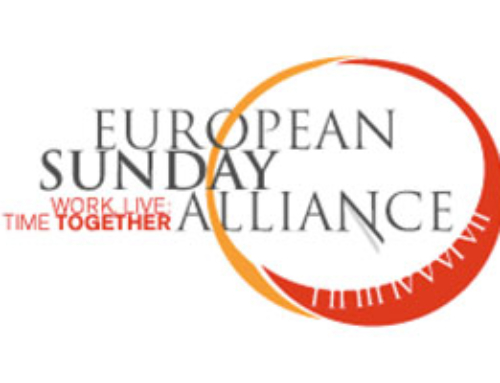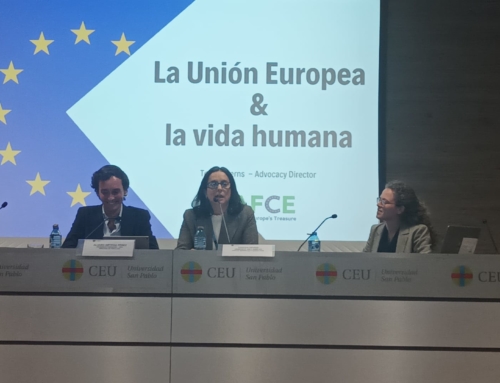Brussels, 10th of October 2023
FAFCE welcomes yesterday’s Council publication of the first-ever conclusions on the interconnection between mental health and employment, with a focus on precarious work. On 9th October 2023, the Council, under the Spanish Presidency, has published its conclusions, which, for the first time, include a significant focus on the impact of mental health on psychological well-being. Among other aspects, the Council invites all Member States to respect work-life balance and “encourage policies to reconcile professional, personal and family life, in order to foster better protection of mental health.”
Our Federation has been raising awareness and calling on to the European institutions to family-centred policies to ensure mental health for years. In our Fall 2022 Board resolution, our Federation called for all EU Member-States for concrete policy actions that will contribute to a healthier mental and physical state of persons, families and communities.
The Resolution of the upcoming FAFCE Board Meeting, taking place in Brussels on 24-26 October, will also be devoted to this issue of concern for many families in Europe.
Among our long-called proposals to be included in the EU following actions on mental health, are:
1. promote family-based taxation systems in order to prevent the unequal treatment of parents and carers; fight prejudices and discriminations against stay-at-home parents, grand-parents and carers; and reward employers supporting part-time job opportunities for carers;
FAFCE also promoted a Resolution of the Parliamentary Assembly of the Council of Europe (8 June 2018), which clearly states “that maternity and motherhood must be supported and protected within the workplace and must not be treated as though they were impediments for a woman’s career”. The same Resolution also asks to “consider recognising unremunerated household and caregiving work at the policy level and in the pension system, so as to guarantee an adequate treatment to women and men choosing caring responsibilities”.
2. ensure adequate and fully paid access to maternity, paternity and parental leaves for parents, regardless of effective time worked: this period should be equally paid, and sufficient as to protect pregnant women and mothers, and leaving them enough time to freely choose leave to breastfeed during a period of six months, as recommended by the World Health Organization and UNICEF;
Our Federation considers that only then ensuring equal opportunities for women and men in the labour market can be achieved. Moreover, we already recalled that these new EU rights are only a minimum, and encouraged EU Member-States to go beyond the 2019 Work-Life Balance Directive, increasing the accessibility to leaves, their duration and the level of income’s replacement for parents and carers.
3. grant full freedom to parents to decide on the division of the leave between the father and the mother; and encourage flexible working arrangements for parents, such as telework, part-time, breastfeeding and nursery rooms;
In a Webinar organised on “Family work-life balance in times of demographic changes: a tool for intergenerational solidarity”, on the 2nd of June 2021, following the International Day of Parents, FAFCE heard opinions of MEPs stressing that families face more obstacles than opportunities when it comes to starting a family: “The difficulties in finding a first job and radically changed lifestyles have led to a shift towards older ages in the formation of first families. Precarious work and the consequent economic insecurity do not help young couples even in the search for a home. The choice to have a family must face to all these difficulties.” (MEP Marco Zullo (Italy)). Marie Oujezdska, Vice-President of Family Union (Czechia) reflected on the notion of “equal opportunities” and stressed the idea that inequalities between men and women are often rooted in parental inequality, as the status of parents is undermined: “We should make efforts to give those who care an equal status and to enable them to care to the extent that they want to, and at the same time to be valued as carers. Caring for the family is not only a private matter, but at least as socially necessary as participating in the labour market”.
4.legally recognise the right to disconnect and a work-free Sunday, as fundamental freedom of each person;
The European Sunday Alliance, in whose steering Committee FAFCE is Member, asked the European Commission to request a research on the positive effect of quality resting time, and in particular of a common weekly day of rest, to improve workers’ work-life balance and reduce mental health issues. In addition, the Alliance insisted on the importance to bring this issue into the upcoming Mental health initiative of the European Commission. On the occasion of the 2023 European Day for a Work-free Sunday on March 3, the European Sunday Alliance recalled the urgent need for synchronised quality and social resting time for workers, in order to enable them to preserve their mental health.
5.implement national action plans of the Child Guarantee, taking into account the current context of increased energy prices and living costs;
As the conclusions recognize, EU collected data demonstrate that “precarious employment is employment that is ‘poorly paid, insecure, unprotected and that cannot support a household’”. FAFCE considers that workers cannot be viewed as a sole group of individuals, but as part of families and communities. Everything starts within a family. The environment young people grow up in has a huge impact on adulthood. Strong and supportive family relationships can provide individuals with a sense of security, love, and belonging, which are all essential factors in maintaining good mental health, particularly in times of crisis, such as the pandemic, war or economic uncertainty.
As a matter of fact, on the 7th of June 2023, the European Commission Directorate-General for Health and Food Safety published a communication on a comprehensive approach to mental health. As the Commission highlighted, “the mental health of our younger generations is getting worse.” and “suicide is the second leading cause of death among young people (15-19 years of age) after road accidents”. Commissioner Šuica also confirmed in the Conference of the Future of Europe that “mental health is a major concern for young people” and stressed that “we must do something about this”.
6.end discrimination of women in the workplace; and launch additional emergency measures for large families and families with special needs.
The Council conclusions also highlight that prevention includes working towards fighting discrimination, including on the basis of “gender, racial or ethnic origin, religion or belief, disability (…)”.
Pay gap is only one element of discrimination many working mothers face. As highlighted in the 2020 FAFCE – New Women for Europe White paper on Protecting Women from Maternal Mobbing, “discriminatory practices towards pregnant workers and new mothers include disincentives to maternity, refusal to recruit, detrimental changes in the terms of the contract of employment upon return from maternity leave, harassment and even refusal to extend fixed-term contracts of employment and dismissal”. Even if indirectly, these practices impact on the short and long-term the pay of mothers. Specific measures must be implemented to prevent those discriminations in order to prevent mental health distress of mothers and families.
FAFCE considers the aforementioned proposals to be a condition sine qua non for which improved mental health at work can become a reality. It considers these conclusions as a positive step towards a healthy family perspective in the employment and social policies, and calls for a more ambitious and family-friendly perspective.







